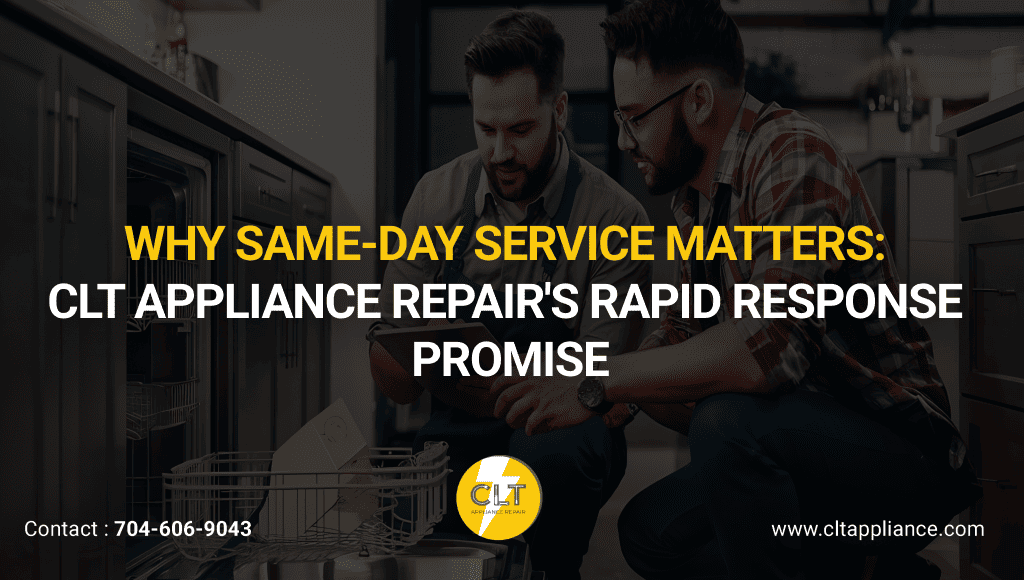Regular home appliance maintenance keeps your household running smoothly while preventing expensive breakdowns. Proper servicing schedules extend appliance life, improve efficiency, ensure safety, and save money on energy bills and repairs.
Understanding when and how often to service each appliance protects your investment and prevents inconvenient failures during busy times. The U.S. household appliances market size is huge and highlights the significant investment households make in these essential devices.
Create your appliance maintenance plan. Get professional guidance today from CLT Appliance Repair.
[Get a Free Qoute: 704-606-9043]
Why Regular Appliance Maintenance Matters
Regular servicing prevents small issues from becoming expensive repairs while keeping your appliances running efficiently and safely.
Neglected appliances work harder, use more energy, break down unexpectedly, and often fail when you need them most. Maintenance transforms potential disasters into manageable routine care.
Peak Performance and Efficiency
Clean, well-maintained appliances operate at optimal levels, using less energy and performing tasks more effectively. Dirty filters, clogged vents, and worn components force appliances to work harder. This extra effort increases energy consumption and reduces performance quality.
Preventing Major Breakdowns
Routine inspections catch small problems before they cascade into complete appliance failures. Loose connections, minor leaks, and worn parts are easy to fix during scheduled maintenance. When ignored, these same issues cause catastrophic failures that require expensive emergency repairs or complete replacement.
Extending Appliance Lifespan
Properly maintained appliances often exceed their expected lifespan by several years, postponing expensive replacement costs.
Research shows that over half of households report appliance lifespans within the “5-10 years” range, but regular care keeps moving parts lubricated, prevents corrosion, and maintains optimal operating conditions that preserve internal components longer.
Safety Considerations
Regular inspections identify potential hazards like gas leaks, electrical faults, and fire risks before they endanger your family.
Faulty wiring, damaged seals, and blocked vents create serious safety hazards that routine maintenance easily prevents. These checks are especially critical for gas appliances and high-voltage equipment.
Preserving Warranty Coverage
Many manufacturers require proof of regular maintenance to honor warranty claims, making scheduled service essential for protection. Warranty violations from neglected maintenance can cost thousands when covered repairs become your responsibility. Documentation of routine care protects your investment.
Don’t risk voiding your warranty! Schedule professional assistance to protect your appliance investments.
[Book Our Service: 704-606-9043]
General Appliance Maintenance Frequency
How often should different maintenance tasks be performed? Appliance maintenance follows monthly, quarterly, and annual schedules based on task complexity and safety requirements.
Monthly Tasks
Monthly tasks focus on cleaning, basic inspections, and filter replacements that keep appliances running smoothly. Monthly tasks prevent the buildup of dirt, grease, and debris that impair performance and create safety hazards
Essential monthly maintenance:
- Clean or replace the HVAC, range hood, and dishwasher filters
- Inspect power cords and water hoses for damage
- Clean appliance exteriors and accessible interiors
- Check for unusual sounds, odors, or performance changes
- Test safety features like door locks and emergency stops
Quarterly or Seasonal Tasks
Quarterly maintenance involves deeper inspections and cleaning tasks that require more time but prevent major problems. Seasonal timing aligns maintenance with changing weather conditions and usage patterns.
Important quarterly tasks:
- Check refrigerator coils and door seals for efficiency
- Inspect the water heater for leaks and corrosion
- Test smoke and carbon monoxide detectors
- Examine appliance vents and exhaust systems
- Clean lint traps and dryer vents thoroughly
Annual Tasks
Annual maintenance involves complex inspections, deep cleaning, and safety checks that require professional expertise and specialized tools. Professional annual service ensures optimal performance and identifies potential problems before they cause failures.
Critical annual maintenance:
- Professional HVAC system inspection and cleaning
- Water heater flushing and safety valve testing
- Major appliance calibration and component inspection
- Deep cleaning of ovens, refrigerators, and dishwashers
- Comprehensive safety and efficiency evaluations
Appliance-Specific Maintenance Schedules
Different appliances have unique maintenance requirements based on their complexity, usage patterns, and safety considerations.
Refrigerator
Refrigerators require regular coil cleaning, filter replacement, and seal inspection to maintain proper cooling and energy efficiency. Dirty coils force refrigerators to work harder, increasing energy costs and reducing cooling efficiency.
Refrigerator maintenance schedule:
- Clean condenser coils – Every 6-12 months
- Replace water filter – Every 6 months
- Check door seals – Quarterly
- Clean interior – Monthly
- Vacuum underneath – Every 6 months
Oven and Range
Ovens and ranges need regular cleaning and annual professional inspection to ensure safe operation and optimal cooking performance. Proper maintenance of these heavily used appliances becomes crucial for both performance and safety.
Oven and range maintenance:
- Clean burners and surfaces – Monthly
- Inspect heating elements – Annually
- Check gas connections – Annually (professional)
- Clean oven interior – Quarterly
- Test safety features – Every 6 months
Gas appliances require professional inspection to prevent dangerous leaks and ensure proper combustion.
Gas appliances need special attention. Our certified technicians ensure safe, efficient operation.
[Schedule Gas Appliance Check: 704-606-9043]
Dishwasher
Dishwashers need regular filter cleaning and periodic deep cleaning to prevent clogs and maintain washing performance. Clogged filters and spray arms reduce cleaning efficiency and can damage the dishwasher’s pump system.
Dishwasher maintenance schedule:
- Clean filter and spray arms – Monthly
- Inspect door seal – Quarterly
- Run cleaning cycle – Monthly
- Check water temperature – Every 6 months
- Inspect the drain hose – Annually
Washing Machine
Washing machines require regular cleaning cycles, hose inspection, and drum maintenance to prevent odors and mechanical problems.
Washing machine maintenance:
- Clean detergent drawer and drum – Monthly
- Inspect hoses – Every 6 months
- Run cleaning cycle – Monthly
- Check door seal – Quarterly
- Professional inspection – Annually
Regular cleaning prevents mold, mildew, and detergent buildup that causes odors and reduces washing effectiveness.
Dryer
Dryers need frequent lint removal and annual vent cleaning to prevent dangerous lint buildup and maintain proper airflow. Lint buildup is a leading cause of house fires and dramatically reduces drying efficiency.
Dryer maintenance schedule:
- Clean lint filter – After every load
- Clean vent/duct – Every 6-12 months
- Inspect the exhaust hood – Quarterly
- Check drum and seals – Every 6 months
- Professional inspection – Annually
Water Heater
Water heaters need annual flushing and regular inspection to prevent sediment buildup and ensure safe operation. Regular flushing removes sediment that reduces efficiency and can damage heating elements.
Water heater maintenance:
- Flush tank – Annually
- Inspect for leaks – Quarterly
- Test pressure relief valve – Annually
- Check anode rod – Every 3-5 years
- Professional inspection – Annually
HVAC System
HVAC systems require monthly filter changes and annual professional service to maintain air quality and energy efficiency. Proper home appliance maintenance for HVAC systems prevents expensive repairs and maintains indoor air quality.
HVAC maintenance schedule:
- Change/clean filters – Monthly or as needed
- Professional service – Annually (spring and fall)
- Clean vents and ducts – Every 2-3 years
- Inspect outdoor units – Seasonally
- Check thermostat – Every 6 months
How to Create and Stick to a Maintenance Schedule
How do you organize effective appliance maintenance? Creating a systematic approach ensures consistent care without overwhelming your schedule.
Identify All Appliances in Your Home
Walk through your home, room by room, to create a comprehensive list of all appliances requiring scheduled care. Make separate lists for major appliances, small appliances, and HVAC equipment. Include model numbers and purchase dates to track warranty periods and maintenance requirements.
Research Manufacturer Recommendations
Check the owner’s manuals or manufacturer websites for detailed maintenance schedules tailored to your specific appliance models.
Manufacturer recommendations override general guidelines because they address unique design features and operating requirements of specific models.
Set Reminders
Use digital calendars, smartphone apps, or printed checklists to schedule and track maintenance activities. Set recurring reminders that account for seasonal variations and usage patterns. Include notes about required supplies and estimated time for each task.
Gather Necessary Supplies
Keep basic cleaning products, replacement filters, and simple tools readily available for routine maintenance tasks.
Essential maintenance supplies:
- Vacuum with attachments
- Cleaning cloths and brushes
- All-purpose cleaners
- Replacement filters
- Basic hand tools
- Flashlight for inspections
Record Maintenance Activities
Keeping detailed records helps track warranty compliance, identifies patterns, and provides valuable information for service technicians.
Include dates, tasks performed, observations, and any issues discovered during maintenance. This documentation proves invaluable for warranty claims and professional service calls.
Professional guidance makes everything simple and effective.
[Get CLT’s Help: 704-606-9043]
Signs Your Appliance Needs Immediate Servicing
Certain symptoms require immediate professional attention to prevent safety hazards or expensive damage.
Immediate service indicators:
- Unusual noises, vibrations, or grinding sounds
- Strange odors, smoke, or visible sparks
- Leaks, standing water, or moisture where it shouldn’t be
- Performance degradation or complete function failure
- Warning lights, error codes, or digital display issues
- Significant increases in energy bills
Don’t ignore these warning signs. They often indicate serious problems that worsen rapidly without professional intervention.
Final Call
Regular home appliance maintenance follows specific schedules ranging from monthly filter cleaning to annual professional inspections. Consistent care prevents expensive breakdowns, extends appliance life, maintains safety, and preserves warranty coverage.
Creating and following a systematic maintenance schedule protects your investment while ensuring reliable appliance performance when you need it most. Professional guidance helps optimize your maintenance approach for maximum effectiveness and peace of mind.
Keep Your Home Running Like Clockwork!
CLT Appliance Repair makes maintenance simple with comprehensive services tailored to your home’s specific needs. From refrigerator coil sorting to HVAC system optimization, we provide the professional expertise that extends appliance life and maintains peak performance.
[Drop Us A Line: 704-606-9043]
Frequently Asked Questions
How often should I service my refrigerator?
You should service your refrigerator every 6 to 12 months, which includes cleaning the condenser coils, checking door seals, and inspecting for leaks or clogs.
How frequently do washing machines and dryers need maintenance?
Washing machines and dryers should be serviced annually, with regular checks for hose wear, lint buildup, and filter cleaning between professional inspections.
When is the best time of year to schedule appliance maintenance?
The best time to schedule appliance maintenance is early fall, so your appliances are ready for increased use during the holiday season, but maintenance can be done anytime.
What are the benefits of regular appliance servicing?
Regular servicing extends the lifespan of your appliances, improves efficiency, prevents costly repairs, and helps maintain warranty coverage.
Should I follow the manufacturer’s maintenance schedule or general guidelines?
You should always follow the manufacturer’s maintenance recommendations in your appliance manual, as they are tailored to your specific model and ensure optimal performance.
What signs indicate an appliance needs immediate servicing?
Immediate servicing is needed if you notice leaks, unusual noises, odors, spikes in energy bills, or warning lights on your appliances.
Author

- John Bennett
- John Bennett is a seasoned appliance repair specialist at CLT Appliance Repair, where he brings over a decade of technical expertise and a strong commitment to customer satisfaction. With a background in electrical and mechanical systems, John has built a reputation for reliable, efficient, and honest repair services across a wide range of household appliances-including refrigerators, washing machines, ovens, and more.
Latest entries
News12/28/2025Fix or Replace? A Guide to Charlotte Appliance Decisions
News12/25/2025Why Same-Day Service Matters: CLT Appliance Repair’s Rapid Response Promise
News12/22/2025Appliance Repair in Charlotte, NC: What to Expect During a Service Visit
News12/20/2025Fast & Reliable CLT Appliance Repair Services for Emergency Breakdowns









